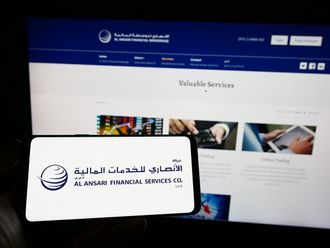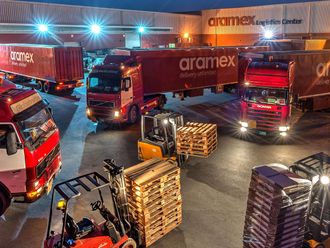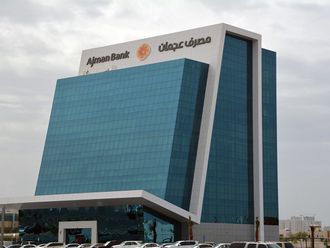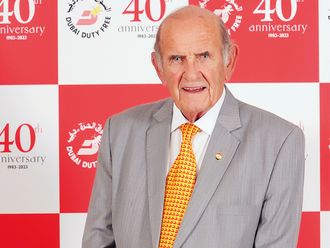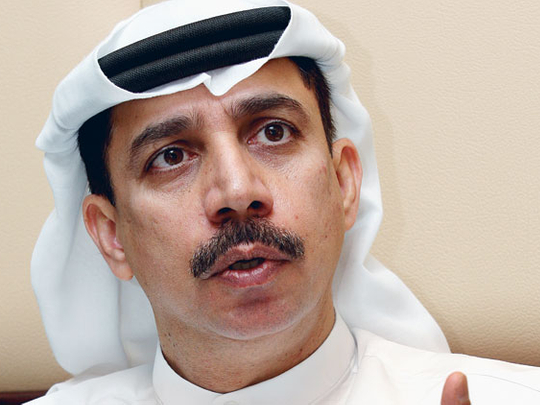
Dubai Financial Market, the first organised stock exchange in the UAE, has been in business for the past 10 years. From its inception, soft-spoken Eisa Kazim was at the helm of affairs at the exchange. Kazim began his career as a Senior Analyst in the Research and Statistics Department of the UAE Central Bank in 1988 and then moved to the Dubai Department of Economic Development as Director of Planning and Development in 1993. He was then appointed Director General of the DFM from 1999 through 2006. Currently as CEO of DFM he has led the transition of this exchange from a tiny bourse of 10 listed companies in 2000 to an exchange with 66 listings in March 2010.
Ahead of DFM's 10th anniversary celebrations, Kazim spoke to Gulf News about his views on capital market development in the UAE.
Gulf News: Now after 10 years in business, how far has DFM been successful in spreading the equity culture and making people part of the corporate wealth of the country?
Eisa Kazim: Our experience in this business has been only 10 years compared to many other well-established exchanges that have hundreds of years of experience. Compared to them what we have achieved is very modest and honestly there is no comparison. Regionally also we are one of the first stock exchanges. Despite our short history and experience, we came under tremendous pressure to be at par with some of the long established exchanges. Whenever we faced a problem, the comparison was always with some of the top global markets. After five years in business we were at par with Singapore Stock Exchange in terms of Activity. In some months in 2005-06 trading activity even surpassed that of the Bombay Stock Exchange. In five years we were internationally noticed and our activity became comparable to some of the established exchanges. That I think is an accomplishment for Dubai and its young stock market.
DFM started as a technology-driven exchange with fully automated trading in dematerialised shares. Has this been an advantage for you?
We were the first fully automated stock exchange in the region. When we started many of our regional counterparts were dealing in physical shares. The over-the-counter exchange that was in operation also used share certificates in transactions. It has been a great challenge to convince investors to part with the share certificates they held as their own. Of course, that was all part of learning to operate in a modern exchange.
Has DFM helped in transforming the corporate culture in the country in terms of transparency, financial reporting and respect for minority shareholder rights?
Learning has been a long process. Board members had to understand that the decisions they make and the information they hold are extremely sensitive and are capable of moving the market. That took a while to sink in. I remember, initially no company except the listed banks were willing to publish their quarterly results. Many simply did not understand the need for sharing the corporate data with shareholders and the market. But over the years all of them have become fully compliant in reporting on time. In ten years we have been able to bridge a major gap between some of the well developed markets. I am sure in the next decade we will cover the remaining gaps in governance standards.
There are a large number of family businesses operating in the country which are still closely held. Do you see the scope for getting more listed on DFM?
Yes, we want a good share of those local and regional family businesses to be listed on our exchange. The family businesses are fairly diversified. They have good exposure to the Dubai economy, and you are right in the sense that many of them are not represented on our market. We are in contact with many of them. Clearly the interest is there and majority of them have indicated that sometime they will seriously consider going public.
There is a large group of successful expatriate businesses here. Are they showing interest in listing on DFM?
They are very keen. We have some successful examples on our market such as Arabtec and Aramex. These are the companies that have been built here in Dubai and they comfortably took them public. There are a large number of such companies from different sectors such as education, health care that have shown interest.
During the past five years private equity firms have acquired substantial stakes in some of the leading businesses in the UAE and the region. Do you expect some of these P/E firms to exit these investments through IPOs in the near future?
We are fully aware of the private equity stakes in the country and the region. As you rightly said private equity firms have acquired stakes in some of the well managed companies. Private equity is the first form of raising capital through equity sale. I am sure a good portion (in some cases 25 per cent to 30 per cent) of these stakes held by private equity firms will eventually come to the public markets.
During the last couple of years DFM has been very proactive in marketing the exchange in financial centres such as London and New York? Has it generated interest from foreign institutional investors?
We were surprised by the interest shown by some of the top institutional investors in our market. You must have noticed that up to 2006 our markets were relatively closed to international markets especially the institutional investors. But the market was open to the GCC investors and to some extent to the expatriate community. In 2007 we started to really focus our attention on international investors following a slowdown in market activities. I think there is growing awareness about our market among international investors; going forward we expect growing institutional participation.
As the global economies are showing signs of recovery, the emerging markets are leading the way in market recovery. Are the UAE markets slightly behind the curve in the recovery process?
Last time when we were in New York with our road show, it was fully booked by institutional investors. We sensed an overwhelming interest in our market and other regional markets. Yes, in terms of investment activity, there has been a lag compared to the previous years. I believe that has a lot to do with global issues. Again, as I said earlier, the listed stocks on our market are dominated by sectors such as real estate, banking and financial services, the same sectors that have been adversely impacted by the global crisis.
The expatriates constitute a big chunk of the population in the country. Some companies allow expatriates to buy and sell their shares but with restrictions. Do you think more needs to be done to increase the participation of this segment of investors in the market?
Currently, companies are allowed to open up to 49 per cent of their shares to the expatriate community. On a daily basis more than 40 per cent of the trade comes from foreign investors including Arabs, non-Arabs and foreign institutions. Certainly, interest from this group of investors is growing. Most companies listed on the DFM except a few are open to expatriate and foreign investments. I am sure most companies recognise the importance of getting the participation of this important group of investors.
Have the corporatisation of DFM and the listing of its shares on the market helped you in any way in your growth and management?
The corporatisation of the exchange has definitely helped us in driving the exchange as an institution driven by profit motive and fully accountable to all its shareholders. Turning the exchange into a listed company has added to the responsibility of the management. Apart from fulfilling the regulatory role of running the exchange, the management has a commercial role in running the business to the satisfaction of its board of directors and ultimately maximising return on investment for our shareholders. Additionally, as a listed company on our own exchange, we need to be an example for other companies in terms of compliance, disclosures and timely quarterly reporting of our results.
How does the branding of the DFM as an Islamic exchange works when you have a number of companies that are not Sharia compliant?
Here we have to distinguish between two things. One is the commercial part of the exchange, that is the money making part of our business. We would like to abide by Sharia in this part of our business when we deal with banks, when we make our deposits etc, we are Sharia compliant. We segregate the revenue generated from the activities of Sharia compliant companies. Soon we will be publishing our own standards for classification of companies that are Sharia compliant that will form a basis for creating indices.
Of course, as a market we have to list all types of products irrespective of whether they are Sharia compliant or otherwise. As part of commitment to Sharia compliance, we do encourage companies to be compliant to Sharia.
As part of consolidation of stock exchanges, you have announced your acquisition of Nasdaq Dubai. One of the things talked about is the introduction of seamless trading through integration of two exchanges. How are you going to achieve this?
Essentially both the exchanges' trading will run on a single engine while one board will provide the quotes on DFM and the other will have quotes from Nasdaq Dubai. In short if the broker is member on both markets he can have the trading system of both markets available on a single terminal. We are encouraging all brokers licensed by DFM to obtain a licence from the DFSA. It wouldn't cost them much as Nadaq Dubai does not insist on having own premises. As far as investors are concerned, the personal identification numbers (PIN) issued by the DFM will be enough for them to trade on both markets. We expect such simple requirements would enhance liquidity on both markets.


